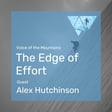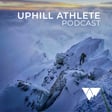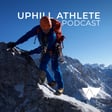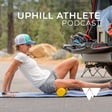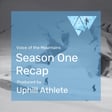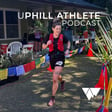Become a Creator today!Start creating today - Share your story with the world!
Start for free
00:00:00
00:00:01

Our Female Coaches Discuss Training and Mountain Pursuits for Female Athletes
Join Uphill Athlete coaches Carolyn Parker, Alison Naney, and Maya Seckinger in conversation about helping women in gain the knowledge to support themselves in training, and build confidence in a mountain environment.
Transcript
Introduction and Resources
00:00:01
Speaker
Welcome to the Uphill Athlete Podcast. These programs are just one of several free services we provide to disseminate information about training for mountain sports. If you like what you hear and want more, please check out our website, uphillathlete.com, where you'll find many articles and our extensive video library on all aspects of training for and accomplishing a variety of mountain goals. You'll also find our forum, where you can ask questions of our experts and the community at large.
00:00:30
Speaker
Our email is coach at uphillathlete.com and we'd love to hear from you.
Meet the Coaches
00:00:37
Speaker
Good day everyone. I'm Carolyn Parker, coach for uphill athlete, a long time rock ice and expedition climber as well as a certified mountain kite. Hi, I'm Allison Naney. I'm also a coach at uphill athlete, massage therapist, mom of two girls, and occasional rock climber and skier.
00:00:56
Speaker
Hi, I'm Maya Seckinger. I'm also a coach with uphill athlete and a lifelong Nordic skier, racer and trail runner. And I love being outside.
Empowering Women in Mountain Sports
00:01:09
Speaker
Well, today we're here to begin a conversation with the goal of helping women
00:01:17
Speaker
gain the knowledge to support themselves in training, as well as build confidence in a mountain environment. We've collected feedback from many women and found a few common themes, including many concerns and frustrations. So we'd like to begin to address some of those topics today. Our first topic or a topic
00:01:42
Speaker
would be this concept of feeling a need to prove yourself. And that seems to be a frustration many women feel of needing to prove themselves when in a mountain environment or when training for competitive events where women are often the minority, and then additionally feeling a lack of support due to that minority position. And that's a real frustration.
00:02:09
Speaker
We three likely all have stories where we can relate to that topic and how we've handled those situations personally and professionally. And I'd love to turn the floor over to my analysis and we'll start a conversation and share some of that.
00:02:28
Speaker
Yeah, I mean, I think we've probably all experienced it ourselves and also have athletes we coach with the similar frustration. The thing I think about the most is in either skiing or climbing or bigger mountain runs or anything where it can kind of just be assumed that the male is the leader or that the male knows the information of where you're going.
00:02:56
Speaker
I catch it a lot on the trail if you run into another party and then they'll just talk to the mail, which can be really, really frustrating. And so I don't, what have your, what have your experiences been?
00:03:14
Speaker
I would say my biggest experience has been, um, after high school, I took a year off to ski professionally and I was the only female on a team with five other guys ranging from 18 to 30. Um, and constantly just like being way behind them training and getting like comments like, Oh, you're so slow. You know, you should try to keep up. And these are like 30 year old, very fit Olympic athletes. Um, and just feeling that like.
00:03:43
Speaker
I mean, I was working as hard as I could, but just feeling let down or like I wasn't good enough and in that atmosphere can just be, I'm motivating. Yeah. Yeah, very much so.
Overcoming Gender Bias in Training
00:03:56
Speaker
Finales and I've had similar experiences that the role that
00:04:05
Speaker
there's a bit of this societal consciousness issue where when there's a man and a woman, the man will always get asked the question. As you can imagine, being a certified guide and having started guiding multiple decades ago, I was the minority. Most of the time,
00:04:32
Speaker
was the only woman on a trip, often the lead guide, guiding men. And if I was with a younger male guide, then additionally, same kind of thing. People would ask
00:04:47
Speaker
the man, the questions and details. And I found that to be frustrating. So I remember specifically a trip when I was in Bolivia, where a friend, and I want to emphasize that some of my greatest supporters and cheerleaders are my male counterparts. So it's not by any stretch, you know, all men. And they're up against some societal conditioning, which is
00:05:17
Speaker
changing slowly, but changing due to the fact that women like you two, myself and others exist and are starting to set the bar and support others, um, and asking them to change their language. But I had a different friend, I had a guy with me, and I was really frustrated with this point of time. He was just being a chauvinist. You know, my internet's so funny.
00:05:45
Speaker
He says, you know how capable you are, and you know you're able, and you have the depth of knowledge and the experience. Do your best to ignore him, because he's a putz. I'm just using nicer language. And do what it is you know how to do, and do it well. And you will shine, and he will shut up. And that has stayed with me for decades.
00:06:14
Speaker
So that's something I think the three of us probably all have experience with, that we have tape recorders and language in our heads to be like, no, no, no. And I don't want to be angry and frustrated internally. That doesn't help me. And it doesn't change that person. Anyway.
00:06:35
Speaker
Totally. Yeah. I think about how, how many times I've been in that in a similar scenario. And often it's with, um, also a male friend, like they're not wanting that scenario necessarily. Um, and often if I pointed out, we're like, whoa, that is kind of wild. And they don't even recognize that.
00:06:59
Speaker
that was really in, you know, even that it really happened, but more that sometimes if someone will then make a comment of like, oh, wow, you're already up here or something, then that nobody would have said anything had it just been the mail. And that can be frustrating as well. But I think you're right to think about just doing your thing. That's kind of the tape recorder that is in my head of like, just keep doing what you're doing.
00:07:26
Speaker
It doesn't matter whether it's a race or any comment. I just try to turn around like, well, somehow that person is probably trying to make a compliment and just keep doing what you're doing. But it can be hard to turn that around when it's in the moment.
00:07:52
Speaker
I think I need your guys' advice and voices in my head more because I, especially being a coach, being young and working with a lot of men specifically, just feeling like I need to prove myself for usually the first eight weeks. And then as soon as like they start seeing results, the conversation, the respect completely changes, but it can be hard because I feel like that imposter syndrome or just feeling like I'm not quite good enough at my job.
00:08:20
Speaker
You know, I'm a good coach. I do know that. And then as they realize it, it completely changes. So Alison and Carolyn, I need your guys. This is good advice for me, even at this stage in my life to hear that. I think at any age, that's good. The proving ourselves piece of this. Yeah. Um, that I feel is a really, so people hear about
00:08:49
Speaker
power of positive thinking. But that goes one step further in the power of language that's used. So I feel like we need to be aware of that. We also need to be aware of the language that we use. There's one place where I really focus the women that I coach, young and old, is the I'm sorry syndrome. So we're going to try to erase that from the recorder.
00:09:17
Speaker
I tell my women inside, outside, if I'm inside my gym, if you drop a 45 pound weight on my toe, you can say you're sorry. But just because you could do a rep or you couldn't lift that weight or you fell on that climb, you know, there's no, absolutely no need to apologize.
00:09:38
Speaker
for what you perceive as a lack of performance or that you thought you let me down because this isn't about me and there's nothing to apologize for. And if we can start changing that language, I think that's part of that deep proving that it just doesn't have to be there. You as a woman training for whatever you're training for, you are in process. You will get there one day and one step at a time.
00:10:06
Speaker
We don't need to apologize for where we're at. Yeah, I think that's so important. And I noticed that with a lot of newer people to training where they want to please me or they want to just do what I think what they think is expected. And so often I'm like, no, this is like, whatever you do is what you can do. And whatever you can do is great. That's how that's how you get to where you want to go.
00:10:33
Speaker
Um, and then as you build, you know, you do little bits, you build that
Women's Unique Strengths and Challenges
00:10:38
Speaker
confidence. And then over time, you don't care that somebody might say something on the trail because you know that you put in the work and you're doing everything that anybody else is doing or maybe more. Um, and it's really cool from a coaching standpoint to see that shift happen too. Yeah. I think just working with female athletes in general.
00:11:03
Speaker
There's always a big transition and I mean, this is a little off topic, but just all my female athletes are always trying to do so much more beyond even what I lay out. And it's, it's inspiring. I'm like, you guys need breast days or you need recovery weeks, but just the strength I've seen in my athletes personally to just keep going with, you know, kids or travel or whatever. There's just a different toughness that I think women possess that sometimes we just don't recognize.
00:11:33
Speaker
Yeah, it's wild to me when I first moved to the Valley, I was known around as the ultra runner. There's that girl that runs all the time and I would talk to people and be like, well, you could do it too. And they're like, Oh, I could never run that far. I'm like, well, you don't just decide one day that you're going to run 50 miles. Like you build up to it. I never thought I would either. And.
00:11:55
Speaker
And then I had a kid and then I would see some of the same people who said like, oh, I could never do that. And I was like, you've had three kids, like you can do anything. And that goes for any, you know, we all have a ton of stuff in our lives that we're balancing. And so, you know, whether you own a business or whether you work a job that's 50 hours a week or you stay at home with kids or like anything, like,
00:12:22
Speaker
Life has a ton of stuff in it. And so anything you decide to do, you can do with little bits of work. And yeah, I don't know. It's just, it's really fun to see people then take that and run with it and realize that they can do something or realize that they have been working toward the things that they already are doing.
00:12:46
Speaker
Like they don't think about their 50 hour a week job as being something that they're accomplishing, but to a lot of people, like to me, I can't imagine doing that. That's incredible that people spend that much time working toward one thing for work. Um, so just changing that perspective is pretty neat. Absolutely. I love the, I love all of that. And I, I know we're.
Tailoring Training for Women
00:13:16
Speaker
The three of us are very aligned. How about we go to another focus? Yeah. Sound good? Yeah. We've got another topic.
00:13:40
Speaker
And that actually is a frustration that was expressed about inadequate training support, training focus. And that's, we'd like to figure out how to manage non-female coaches, modifying training inappropriately for women.
00:14:09
Speaker
Just because we're women doesn't mean that the training should simply be easier. It does not mean we can't be equally as strong, if not stronger or faster than our male counterparts. We may just need to modify the training due to vastly different physiologic makeup than men. That's all.
00:14:31
Speaker
Fortunately, the three of us have gone through this in a personal formula and format in multiple sports, as well as professionally with helping women. So we have a diverse background, and maybe we can share a few of those experiences of how we've adapted and how we've supported others. What do you think, Maya?
00:15:01
Speaker
this was an interesting question so I thought about this before we had this chat and I was trying to think of like an example for myself I worked with Scott now since I don't know for nine years um
00:15:12
Speaker
male coach, and I always had the opposite problem with him. Um, and I cleared this before I said this, I didn't want to like throw them under the bus. Scott's a wonderful coach, but he would always over train me, like do way more than I could. Um, and I think, you know, being an athlete, I've learned now as a coach that women are not like everyone needs their own individual training. And, you know, in his defense, when I was 15,
00:15:39
Speaker
other girls can handle what he was giving me, but I just couldn't. I'm late to developing. So I kind of had the opposite problem, which I think other women have too. And, you know, I would get frustrated at myself because my teammates were training more or they could do more pull-ups and feeling inadequate. But I think now as a coach, I think that
00:16:02
Speaker
into everyone and you know people get really frustrated women and men I think about you know feeling like they're not doing enough when they need to just realize where they're at is great and training needs to be adapted for every individual. That's not quite the topic but that was sort of my takeaway from thinking about it. That's kind of what I was thinking about too and I think one thing that is a little tricky with
00:16:29
Speaker
Training women is, I think both men and women think maybe it's completely different and it is in some ways, but in some ways it's not at all or for some people it is very similar than training for men and
00:16:48
Speaker
Um, if you're doing an expedition where you're going to be having to carry 60 pounds, you're going to be having to carry 60 pounds. So eventually you'll need to be able to do that too. And you can, um, and we'll talk about this in the, in the next theme about, but maybe we just tailor the, the plan slightly differently so that you're doing strength when you know that you're going to be.
00:17:12
Speaker
the strongest in your cycle or if you have an off day then you don't say like okay well I guess I'm not cut out for this but rather you talk to your coach and you're able to do it on a different day or you modulate the workout so that you're doing
00:17:30
Speaker
you know, intervals instead of one solid session. And so having the depth of knowledge also to know how much just individual, individualization there is, whether you're a male or a female, I think is really important. And I think sometimes women will also downplay what we're capable of and think that we can't do as much.
00:17:59
Speaker
But trying to just, I mean, ultimately, I would hope that everything is an individualized approach. And we just know the common factors that women are addressing, but not making that completely shift how we're training in particular. I think that,
00:18:27
Speaker
that's all incredibly valuable insight. And that's a huge piece of why I think the three of us enjoy coaching and want to be coaches is that we can be that voice until the voices within the athletes have themselves of that learning to listen to your body. So through hormone cycles or whether it's
00:18:57
Speaker
you know, setting a goal and understanding that as women, we have different strengths. Maybe we don't have as much testosterone on board as men, not nearly as much. And so certain aspects of getting strong may take longer and may take a different design, but we can most assuredly achieve the goals.
00:19:23
Speaker
Turns out that women, hormonally, is when we're younger, and most of the time, these are statistics, we tend to be better at endurance when we're all through our lives. It's the way we work metabolically.
00:19:37
Speaker
Doesn't mean that men aren't great at it. So it doesn't mean that these are all the things. So we look at where we are as an athlete. We look at our physiologic makeup and our experience level and what we did and where we're going. And we design a program and I, and execute it and then listen.
00:19:58
Speaker
Are we tired? Are our bodies saying things? Observe how that training works around our menstrual cycle. I would imagine that the three of us all have different personal experiences with how that affects us, which when you think about that is
Open Discussions on Physiological Needs
00:20:15
Speaker
It's really pretty incredible. So that's what's a great thing about having our knowledge base, both from personal experience, the hundreds of athletes who've coached and friends in life to help support.
00:20:29
Speaker
each other and create a platform where discussions can be easily had and feel comfortable about asking those questions and speaking up. It's one of the things I mentor my staff about right now, my young guys who work for me in their 20s and 30s, it's like, I'll talk about anything you want to talk about. I'll help you any question, whatever it is. Don't feel like you have to be quiet about what your body's going through.
00:21:02
Speaker
Yeah. I mean, just think if we, if men were treated in similar ways, we're like, well men aren't as good at endurance. Like men aren't trained to think anything. They can do anything they want. And I think it is really cool. I'm like, I'm raising two girls and that's really fun. And that's, in some ways that's a more fun,
00:21:29
Speaker
I have another friend who has a son and she's like, well, you get the fun task. I'm also debunking social norms, but it's a harder thing to do to have an emotionally compassionate boy that's six years old. So all a work in progress.
00:21:59
Speaker
Anything else, Maya? Not really. No, I think you guys kind of touched on it. I think training for the individual is super important. I mean, every woman is different. Some women have more testosterone than others. You know, people respond to strength different, to endurance different.
00:22:20
Speaker
And I think just really learning to like accept where you're at. And it kind of goes back to our first topic of just like having confidence in where you are. And, you know, even if a male coach tells you one thing or not, sometimes you just have to be okay with like kind of shutting that voice out and just doing yourself, like doing you. Yeah. Yeah, I agree. So.
00:22:52
Speaker
Let's jump into another subject. Adjustments for our reproductive health. This falls under one of the most significant physical differences. This segues nicely. Women and men is our reproductive cycle.
00:23:14
Speaker
associated with the scent of certain hormones, ability to bear children, which creates a significant need to adjust training pre and postpartum. Considerations must be made for training relative to those menstrual cycles and relative to menopause. Whether this becomes even more unique is incredibly broad spectrum of experiences women have managing their reproductive health.
00:23:40
Speaker
And we all have a deep, diverse knowledge base from both personal and professional experience. Um, also Maya, do you have any insights and stories? I haven't really, I never really realized that I had any fluctuations training wise until, um,
00:24:03
Speaker
Honestly, probably the last, well, because I just never really thought about it. I just would do whatever I was supposed to do on my plan, and some days I'd feel bad, and sometimes I'd feel good, and I never thought anything of it.
00:24:21
Speaker
And then after having kids, it just seemed like there was a little bit, it was a more noticeable difference. And I guess that also could coincide with getting older. So maybe it was also more noticeable. And then I just started to realize that there was a pattern to it. What do you know?
00:24:39
Speaker
that I felt good right after I'd started my period and I felt really strong and I could do whatever and then about halfway through my cycle, what do you know, I felt like crap and everything was just hard and my balance was off and
00:24:55
Speaker
don't ask me to do like touch my toes and do anything else because it was just my my proprioception and everything was off so and then as I read more about it um I then got more interested in it and had friends who have very different
00:25:16
Speaker
um very different experiences and athletes who have very different experiences um and it's just fascinating to see how how it shifts um but what's been now really fun and i think stacy sims book roar has been a really
00:25:38
Speaker
big gift to the world.
Menstrual Cycle and Training Impact
00:25:41
Speaker
I still think it's one of the only books about reproductive health and athletics with for women to show what happens with the cycle and being able I'm working with more and more women who are wanting to track train like using training in sync with the cycle so having the recovery week during the time that they know they're not going to be feeling as great.
00:26:05
Speaker
So that's just been really fun to play around with and kind of have people who are wanting to listen, like you mentioned, Carolyn, just listen more to their body's feedback instead of looking at a metric or having some measurable that's showing what your body is doing and instead of just listening to what you're feeling in your body.
00:26:36
Speaker
Okay. Maya, how about you? I'm going to be the most uneducated in this topic. So I'm in my early twenties for people who don't know. And due to training and birth control, I really until just recently did not get my period for the last six years.
00:26:57
Speaker
So I'm kind of in a different boat. I think it's cool how we're all different ages and have different life experiences. I feel like I'm very uneducated in this. I'm glad there's a book recommendation. I will order it from Amazon after this discussion. As far as coaching goes, I listen to what women say to me. Having had a male coach most of my life, it's never been a topic of conversation. It was never really discussed.
00:27:23
Speaker
Um, so I didn't really, I feel like I haven't had that education as far as like coach athlete goes. I always just talk to my athletes, whatever they're comfortable with. We do some, I've had women athletes. I've never talked about it with, um, I've always just had the mindset of it. Like.
00:27:40
Speaker
It's kind of pissed me off, honestly. And I think that's being younger. It's just like, this is unfair. I have a period. I just am going to pretend like it doesn't exist and just train or do whatever, not pay attention to it. So I think there's other women with that mindset. I have women who don't train, you know, during their week, um, during their cycle and that's fine too. So I've sort of learned as I've gone with coaching, I think I've learned more from the coaching side than I did the athlete side because
00:28:07
Speaker
Yeah, it's just never been discussed, even with female coaches I've had, it's just not talked about. So I definitely have a lot to learn from you two and from other women in general about this topic.
00:28:22
Speaker
I think that's really also a good, a really valuable perspective though, Maya. I have some clients who also don't bring it up and don't really, I actually get the sense that maybe they feel the same way, also younger athletes. And it still isn't always a comfortable conversation. And it sometimes is easier to,
00:28:46
Speaker
think and I think this is where I didn't really start thinking about it until later also. It's like it is a pain. It is nice to just ignore it and just like put your head down, do what you want to do, and yeah and then just go that way. So I don't think and kind of going back to kind of our overall theme of whatever you're doing is great. Do whatever you can that is gonna
00:29:15
Speaker
work best for you. And I don't think, I think it can sometimes be put too much of an emphasis on too. And it doesn't necessarily need to be that way either. Carolyn, what do you think? I agree with all of that. And I think, you know, it's interesting. I think that
00:29:39
Speaker
One of the reasons that conversations don't happen is I do believe that there is an underlying oppression, a sense of, oh, you know, we shouldn't talk about that. We don't talk about that. Again, just being older, understanding even the issues of women's reproductive health and how it's been managed in the last hundred years doesn't necessarily
00:30:03
Speaker
make it something that we talk about, although that's changing. And I think that's valuable. You don't have to talk about it. But if there's a comfortable platform to have the conversation, then that's a lot easier. I personally, as an athlete, I was fortunate. I'm a lot like you, Allison.
00:30:28
Speaker
Always performance was highest right after I started my period. Low the minimal fluctuations with estrogen progesterone. I run high statistically on testosterone or used to. I'm now in full menopause, which is another interesting topic for another time. But what I used to do when I was performing
00:30:56
Speaker
If it was training for climbing and training for a event or a climb, I would schedule my international trips around my cycle so that ideally I was climbing at the most important time. When I was working and guiding, that was always tricky because you're working. And we'll have a conversation again about this, like how do you manage all of that in a mountain environment?
00:31:20
Speaker
doing 12, 16-hour days and dealing with menstrual flow. And I was the type that would just suck it up and deal, because sometimes you just have to, based on what your goal
Reproductive Health Education
00:31:34
Speaker
is. That's fine. And then other times, one needs to listen. And we figure that all out, and I think
00:31:46
Speaker
we want to figure that out through science, through educating, through having that forum to talk about so that women know their resources. And I think the other thing would be for women who are challenged even with say endometriosis, ovarian cysts, I mean, the list is so long is that there is support.
00:32:14
Speaker
And you have a community and it may be outside of the Western world, but to go ask questions. Have we finished our third topic? I think pretty much.
00:32:32
Speaker
Yeah, I was also going to add another thing that I think is interesting. And this is, again, more at my age group and a lot of my athlete female friends have talked about just birth control and that effect on your body and all the side effects, you know, and we're all still kind of figuring it out at this age, but there's a lot of stuff that affects performance that we take as women that I think is interesting. And just the general societal
00:33:00
Speaker
misinformation that I think reflects back to like body type, but also reproductive health. And, um, like I personally just recently learned that, you know, everyone kind of carries like lower stomach fat to protect their uterus. I'd never learned this. And yet there's like a societal push to like lose stomach fat. And that's really important. Um, and just like that misinformation, I think is on that topic of just female health in general. Yeah.
00:33:31
Speaker
Yeah, it gets fired up, makes me want to start a revolution. So I had my first experience with hormone, the pill, when I was 19, long time ago.
00:33:50
Speaker
It wasn't good. I threw it away and refused to use hormones for birth control for my entire life. Um, I have read books, the thing that I'm like, no way, not messing with my body. Um, now that doesn't mean that people shouldn't, there are clinical medical reasons at where people and what it was designed for. Um,
00:34:17
Speaker
And so researching that and knowing that before you put it in your body is invaluable. As far as a revolution, you should read Jane Against the World. Okay. Got it. I'm getting some of the books today. Yeah. I mean, I think we're all kind of on.
00:34:42
Speaker
I mean, I took birth control for years and years and years, and we're all kind of in this like long term study to see what happens when you take birth control for that long. It's kind of, I don't like thinking about it. But then I too, I ended up going, I was like, I'm not doing this anymore either. So there are ways to do it without, and it's pretty cool, which also is just learning more about your body, which is also neat.
00:35:13
Speaker
Absolutely. And there are clinical times, it's an invaluable treatment. Some women with severe endometriosis, you know, can't function without regular hormone support. Yeah, I'm very glad that we have it. It's definitely good to have. Yeah, absolutely.
00:35:41
Speaker
For me, sometimes I feel like Western medicine and maybe female doctors, maybe women, about options and health. And we need to go in well-educated before we make those traces because some of the motivation for doing these things health-wise is big pharma and not necessarily what's right for women.
00:36:11
Speaker
Um, we could probably talk for a long time about that subject. Totally. Oh, yeah. Anyway. Well, what do you think, um, feel good about this one? Yeah. I think so. Yeah. I mean, we've, I think this is giving us a lot of good topics to like go off of as we go further into this group.
Community Engagement and Conclusion
00:36:38
Speaker
Um.
00:36:39
Speaker
Yeah, so I think this is awesome for now. Well, in that case, we look forward to our female uphill athlete group chats beginning in January and a greater and increased opportunity for creating connection, community support, and sharing our knowledge. And we'll look forward to more time soon. Yeah. Yeah. We hope you'll join us.
00:37:09
Speaker
Thanks for joining us today. For more information about what we do, please go to our website uphillathlete.com.










